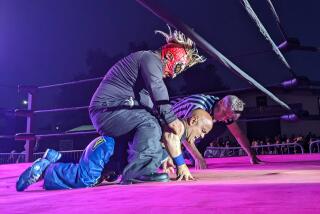SUMMER MAT-NESS : Travel, Tournaments and Camps Among Options for Wrestlers
- Share via
SAN DIEGO — With graduation and prom to consider, Mount Miguel’s Dwayne Buth almost forgot that he needed to pack, too.
Buth and Monte Vista junior Ron Cottrell are part of the junior California USA Wrestling team that left Tuesday for Japan.
“I’ve never wrestled overseas,” Buth said before leaving. “It’ll be unique, and I’ll have memories I’ll never forget after this trip. That’s what I like about wrestling- you never know everything. Each coach and wrestler has his own style and philosophy. I can go into the wrestling room for two hours, and if I only get one thing out of it, that’s good. I know I’ll learn something from Japan I can put to future use.”
Each year, California USA Wrestling (part of USA Wrestling, the sport’s national governing body) sends a junior team on a cultural exchange trip. States take turns selecting the countries to visit. It is California’s turn to take a team to Japan, the 30th anniversary of such exchanges between the countries.
In honor of the anniversary, USA Wrestling decided to solicit applicants for the team. Candidates had to excel not only in wrestling, but in leadership and citizenship. Three letters of recommendation had to accompany each application.
Before leaving, team members met in San Jose for three days of practice and briefings on Japanese customs. They will return July 4.
“They (learned) the dos and don’ts, like take your shoes off before entering a home,” said Lynn Dyche, team organizer and coach at Santa Teresa High School in San Jose. “We want to try and make this a true cultural experience for the boys.”
Both Buth and Cottrell heard about the trip at a preseason freestyle tournament.
“I figured I’d never be able to raise enough money, but Dick Bailey (San Diego freestyle coordinator) gave me an application and a recommendation, so I thought about it, and it sounded good,” Cottrell said. “It just hit me this week that I’m going overseas to wrestle. I really want to see how good of wrestlers they are.”
The wrestlers had to finance the $1,600 trip themselves.
“I sent them ideas to solicit help,” Dyche said. “It’s a good learning experience for them.”
Cottrell said the first $600 was easy, but that it then got harder.
“The last $600 was the hardest. I’d get $25 here, $10 there. I went to my dentist, businesses, wherever I thought they could help me. It was hard and humiliating at first.”
The team members will compete in a dual meet in each of the eight cities they visit and stay in the homes of Japanese wrestlers. They will arrive in each city the day before the match for practice. But the trip won’t be strictly business. Between matches, they will tour Japan.
“They keep us going on a very fast schedule,” Dyche said. “The Japanese are tremendous hosts.”
Not that many young wrestlers have the chance to gain international experience, but there are other off-season wrestling opportunities, including national freestyle and Greco-Roman tournaments.
Because the availability of wrestling scholarships is dwindling as universities are forced to make budget cuts, it is vital for wrestlers who want to compete at the college level to gain at much exposure and experience as possible.
“If you look at the state (high school) champions, they all have had freestyle or Greco experience,” said Glen Takahashi, who coaches Valhalla and is a member of the California junior national team coaching staff. “Looking at the college recruiting picture, they use the state freestyle and national freestyle tournament for criteria. Most of the big names (in the college recruiting picture) are extensive freestylers--not too many are just high school wrestlers.”
There are two national tournaments for high school wrestlers each summer: the Cadet, for 14- and 15-year-olds, and the Junior Olympics, for ninth through 12th graders.
Three San Diego wrestlers qualified for the California Cadet team and will compete today through July 2 at the nationals in Warrensburg, Mo. Jason Hendrick, who just completed his junior year at Valhalla, will wrestle freestyle. Freshman teammate Tom North and Granite Hills freshman Corey Farkas earned spots in both freestyle and Greco.
“If I do good, I’ll have good credentials if I want to petition to a higher team (such as the junior national team). It’s nerve-wracking,” North said. “I feel pretty confident because California has one of the top teams. Because I’m from California, some people will be scared of me and don’t even know me.”
After his trip to Japan, Buth will travel to Cedar Falls, Iowa, to compete in the Junior Olympics, July 17-22, at 191 pounds in freestyle. Hendrick will compete in Greco-Roman, and Poway’s Brian Wallner qualified at 123 pounds in freestyle.
“This is the toughest tournament a high school kid can be involved in,” Poway Coach Wayne Branstetter said. “It’s the best of the best in the nation. There are 100 guys in weight class, and to win it you must be quite a wrestler.”
Because wrestling is ever-changing with new techniques, summer camps are an excellent way to keep updated. Camps also offer the opportunity to train under someone other than the wrestler’s high school coach. Another benefit, Mount Carmel Coach Jose Campo said, is that wrestlers can meet athletes from other schools in a less stressful, non-competitive atmosphere.
It is surprising that despite the number and caliber of high school wrestlers coming out of California, this state has fewer camps than others. Three California universities--Cal State Fullerton, Cal Poly San Luis Obispo and Cal State Bakersfield--offer week-long camps.
“It’s a good chance to go visit a college, stay in a dorm, meet the coach and find out a little of what college life is all about,” Campo said.
Perennial wrestling powers such as Oklahoma State, Arizona State, Iowa, and Penn State offer both week-long camps and more intensive two-week camps. These offer a combination of technique and conditioning. Wrestlers are on a strenuous schedule of running, wrestling, and weight training, followed by more wrestling. They are often trained by national and world class competitors and coaches.
“Kids go to camps if they want to be winners, and there is an attitude and dedication that kids will pick up,” Takahashi said. “It’s very positive for kids to go to camps, and we encourage our kids to go.”
For those who cannot afford to spend $250 or more to go away to camp, there are two local opportunities for wrestlers to get the same quality instruction but for a lot less money.
This is the first year that a camp will be offered here, at the Horizon Christian Church July 24-28. Area Christian coaches train the wrestlers, concentrating on technique. The $70 fee goes to the church’s sports ministry.
Palomar Junior College offers two camps each year, one at the college and the other at El Cajon High School. They emphasize leg wrestling and takedowns.
More to Read
Get our high school sports newsletter
Prep Rally is devoted to the SoCal high school sports experience, bringing you scores, stories and a behind-the-scenes look at what makes prep sports so popular.
You may occasionally receive promotional content from the Los Angeles Times.






